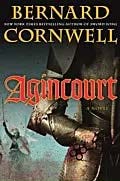Agincourt is a masterpiece of war fiction, taking readers as close to the experience of medieval warfare as any of us would probably ever want to come.
Nicholas Hook is an English shepherd's son, trained to the bow from childhood, embroiled from birth in a vendetta against the family responsible for his grandfather's murder. The constant pitch of suspense in this novel comes partly from the family feud, which follows Hook across the Channel, as well as from his experiences as an archer in Henry V's army.
"The first sound was the bowstrings, the snap of five thousand hemp cords being tightened by stressed yew, and that sound was like the devil's harpstrings being plucked. Then there was the arrow sound, the sigh of air over feathers, but multiplied, so that it was like the rushing of a wind....
"For an instant there was silence.
"Then the arrows struck.
"It was the sound of steel on steel. A clatter, like Satan's hailstorm.
"And the day's noise of pain began."
Cornwell's research is wide and deep, presenting minute details of medieval life such as the construction and use of the English longbow, as well as authentically recreating the psychology of a time when people felt fewer qualms about killing but also cleaved to a piety most people today would find both inconsistent to the point of irrationality and simplistic to the point of superstition. Never do these details slow the novel's page-turning pace; rather, they bring readers inside the world of the story and intensify our identification with the characters.
Remarkably, Cornwell makes readers thrill to the triumph of the English victory at Agincourt without glorifying warfare itself. The triumph is, in fact, directly proportional to the fear, suffering and degradation of the campaign preceding it, as well as to Hook's enduring struggle to remain alive amid the carnage, not just literally, but emotionally and spiritually.
(2008, 451 pages, including a Historical Note separating fact from fiction; titled Azincourt in the U.K., after the French spelling of the battle site)





Cornwell is a master of historical military fiction. If you liked Agincourt, try his Grail Quest series, which also follows an English archer. He has written dozens of books about several other time periods, too. You can't really go wrong with Bernard Cornwell.